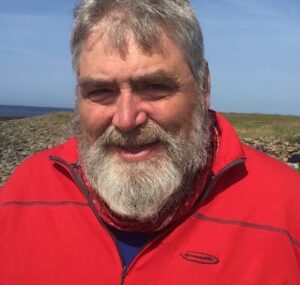Dr Stephen Dockrill is Senior Lecturer in Archaeology, School of Archaeological and Forensic Sciences, University of Bradford. Dr Dockrill is interested in the interface between economy and social hierarchies and in new techniques of site recording and visualization. Over the last 30 years, his research has centred around the investigation of “deep-time” or multi period sites in the Northern Isles of Britain (Tofts Ness, Orkney, the South Nesting Project, Shetland, Old Scatness, Shetland, Jarlshof, Shetland). These sites have long stratigraphic sequences over a millennium or more, allowing the impacts of cultural, climatic / environmental and economic change to be studied as core themes. This has resulted in the publication of a number of excavation volumes and research papers covering many aspects of these core themes. Current research (with Dr Julie Bond) centres on the excavation of an eroding coastal site at Swandro, on the Island of Rousay as part of the Gateway to the Atlantic Project and Rousay Field School, centred on the island of Rousay, Orkney (with Drs Julie Bond, Ingrid Mainland, Ruth Maher, Jane Downes). Here a Neolithic Chambered Cairn and a secondary settlement site spanning a millennium (from the Iron Age to Norse period) are providing the opportunity to assess the impact of coastal erosion and to inform on the core themes of marginality and adaptation to environmental and climate change. The research provides an important opportunity to develop student understanding of the fragility of the coastal archaeological heritage and the impact of climate change within a field school environment. Dr Dockrill is joint holder (with Julie Bond) of the University of Bradford’s Vice Chancellor’s Teaching Excellence Award 2015 for the development of teaching methods in archaeological fieldwork.

Dr Stephen Dockrill
Circumpolar Observatory
Related Affiliates
Please select listing to show.